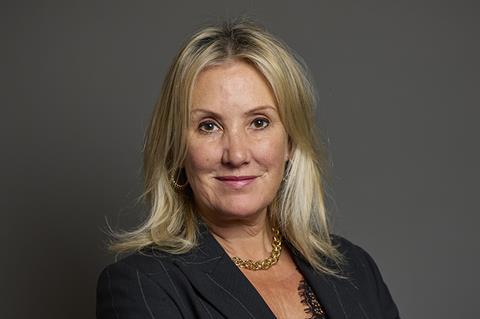A report by the British Screen Forum analysing BFI certification data over a 10-year period underlines the grave state of UK independent film financing.

Industry figures in the UK have reacted with a mixture of defiance, fatalism and dismay to the stark data in the British Screen Forum report Show Me The Money!. Described as “lance-like in its clarity” by one attendee at its mid-September launch, the report highlights the parlous state of UK independent film financing.
Its author Ben Keen, with access to BFI certification data over a 10-year period from 2014 to 2023, revealed total investment in local film production plummeted to £160m ($214.3m) in 2023 — its lowest ever level — compared to a high of £406m ($544m) in 2016 and less than half of the £327m ($438m) achieved in the post-pandemic recovery year of 2021. His report also highlights the “collapse” of equity investment in UK indie feature production, which covers a period before the new UK Independent Film Tax Credit (IFTC) was announced in the last government’s spring Budget, allowing eligible films to claim an enhanced Audio-Visual Expenditure Credit of 53% (approximately 40% after tax) on qualifying expenditure for budgets up to £15m ($20m).

MP Caroline Dinenage, recently re-elected as chair of the UK Parliament’s culture, media and sport (CMS) committee, has confirmed it is likely to be looking closely at the report’s claims. “The findings of the report are a stark reminder of the challenges facing the British film and TV industry,” she tells Screen International. “It is precisely why, as chair of the previous CMS committee, I was keen to launch an inquiry into British film and high-end TV. I hope I can persuade the new committee to reignite that work and build on it to help ensure the sector remains one of our global cultural success stories.”
Others have acknowledged the report lays bare uncomfortable home truths that were already widely known, if not always openly acknowledged. “All the detail in the report echoes the work we did in 2017 right through to us getting the enhanced tax credit in the Budget this year,” says John McVay, CEO of UK independent producers’ association Pact. “The fundamentals are what we’ve been talking about for years — declining pre-sales, less capital coming into the market, budgets going down which impacts on the competitiveness and quality of our product.
“That means it’s even harder to recoup and go into profit,” he continues. “The statistic in the report about how few producers went on to make another film [after their first feature] is something that all our research picked up.”
Credit rating
The statistic in question notes only 10% of producers during the period covered made more than one film, and of that 10%, 92% have made no more than three films. It remains to be seen what kind of boost the 40% tax credit for indie film will give the sector. Although anecdotal evidence suggests it is already being used by producers and financiers to get UK indie projects off the ground, McVay cautioned the measure has not yet been ratified into law. Claims cannot be submitted until April 1, 2025.
“That means it’s very hard to borrow against the new tax credit. There are some people in the market who will offer funds but, by and large, it’s very difficult, even if you’ve got approved by the BFI,” says McVay. “[Lenders] want to see the detail.
“We tried to get this tax credit over the line in 2017,” he adds. “I only wish we had done it then because maybe that report would be a different read now.”
Producers themselves expressed frustration at the suggestion floated in the report that many of them lack the “entrepreneurial vision and management skills required to scale production companies able to compete successfully in the global market”.
“We don’t sit around complaining because we know the risks inherent in what we do, but it would be nice if people didn’t tell us we were not commercial,” says UK producer Andy Paterson, whose credits include Girl With A Pearl Earring and The Railway Man. Paterson recently partnered with Tim Richards’ Vue cinema chain and virtual production outfit Dimension Studios to form Virtual Circle, with a slate of £5m-£15m ($6.7m-$20m) UK independent movies in mind.
“Ben’s report has done a great job in laying out the facts [but] I take umbrage only at being told we are not good at what we do,” continues Paterson. “In this country, it is astonishing what gets achieved in terms of film production. It is just an almost impossible task — don’t tell us we’re not good at it. Look deeper into the inherent problems of making one-off risky and creative business choices.”
He also questioned the idea that UK producers should diversify into the high-end TV production sector to give their companies a better chance of success. “To make the kind of indie films that audiences want, you have to be passionately driven. You can’t go and run another business.”
“The report shows declining income,” notes UK film financier Phil Hunt, CEO of Head Gear Films. “That is where we are. We are in an industry where the income is declining while the cost of production is increasing.”
Hunt described the recommendations in the report, which include producers developing better media management skills and encouraging investment in UK talent beyond debut features, as “reasonable”.
“They would be great to bring into play,” he says, while adding the caveat, “there is nothing really new in these suggestions”.
“The report confirmed everything we already knew,” agrees accountant and film finance expert Dave Morrison, a partner at Nyman Libson Paul. “That report does not tell me anything I would not have expected to see, but it does put some flesh on the bones because you’ve got figures proving it.”
Morrison did not see any immediate prospect of increased investment in UK indie film given the negative publicity surrounding the industry. “It will takes years to recover from that but the reality is that even if you took that away, most people who have invested in film have lost their money,” he says.
Hard choices

Keen’s findings were chewed over by a group of experts at a session following the presentation of the report. “It has always been a tough job to be an independent producer. I think it’s even tougher now and I feel these numbers [in the report] really show that,” said Dimitra Tsingou, previously at Pulse Films and Protagonist Pictures, now producer and founder of House of Zinc.
“It is a challenging time, pre-selling can be hard, access to equity finance is hard and access to top talent is hard. All the things that traditionally made our business run are no longer straightforward,” agreed Dave Bishop, CEO of sales, finance and production firm Protagonist Pictures. “It takes a huge team to get any independent production across the line.”
The lack of investor confidence in UK indie film after a series of well-publicised scandals was also picked up on by speakers. “There are too many stories that would ward off investors in this industry. We all remember the film partnerships. They played out on the front pages of the dailies,” noted John Glencross, chief executive of Calculus Capital.
Glencross’s private equity outfit has invested successfully, through its BFI-backed Creative Content EIS Fund, in outfits such as Colin Firth’s Raindog Pictures, along with Brouhaha Entertainment, Maven Screen Media, Wonderhood Studios, Home Team Content and Jude Law’s Riff Raff Entertainment. Calculus also took over fellow financier Great Point’s debt-based film financing arm Illium following the death of Great Point founder Jim Reeve and the company’s falling into administration in March of this year.

“The reputation of film investment in the UK has been a challenge for many years,” agreed Bishop at the session of the current difficulty in accessing high-risk equity and gap finance in the UK. (The report notes that collapse in equity investment available from UK specialist financiers is pushing some UK producers to seek funding from US sources instead, often at unfavourable terms.)
In the coming months, UK film is expected to be boosted by the releases of high-profile titles including Paddington In Peru, Bridget Jones: Mad About The Boy and 28 Years Later. Nonetheless the situation remains dire for smaller indie projects.
“This is the only industry where the creators of the product say, ‘I know what I want to make,’ without a great deal of reference to what the market might be looking for,” said Glencross of the struggling UK indie film sector. “In this country, there’s too little regard to what the market wants. In a way, it’s almost like swearing in the cathedral to say that.”















![[L-R]: Amanda Villavieja, Laia Casanovas, Yasmina Praderas](https://d1nslcd7m2225b.cloudfront.net/Pictures/274x183/6/4/1/1471641_pxl_20251224_103354743_618426_crop.jpg)









2 Readers' comments